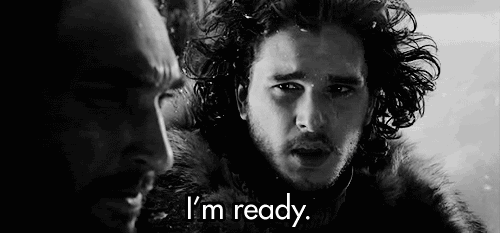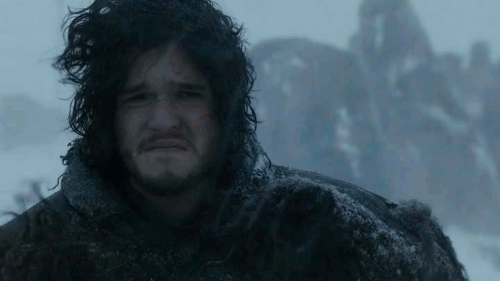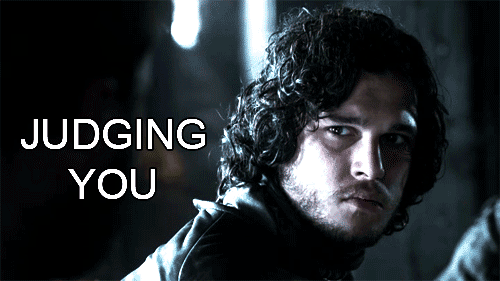This review is by Sabra Nicole, who previously wrote a guest review for How Not to Fall, which is the first book in this series. She absolutely loved it, so of course we want to hear how she liked the continuation of Annie and Charles’ romance. Her Twitter bio says she is a writer of things…mostly words, and she’s that fluent in both Geek and Sarcasm.
How Not to Let Go, the second novel in Emily Foster’s Belhaven Duology, picks up pretty much where How Not to Fall left off: Annie and Charles’ one month of sensual exploration is at an end, and everything feels awful.
[Fair Warning: characters feeling awful is a Thing in this book]

[No, Jon…you’re really not]
I mentioned in my last review how I appreciated the fact that How Not to Fall didn’t treat sex as the Quick Fix. Nothing is magically alright once Charles and Annie have their orgasms. Annie is still falling in love with Charles, and is determined to “fix” the part of him that keeps him from reciprocating. Charles is still burdened with decades of repressed anger and fear, and feeling unbalanced as his tried-and-true coping mechanism is ruthlessly called into question.
In How Not to Let Go, this dismantling of Sex As A Quick Fix is taken a step [several, huge, leaping steps] further. Annie, pretty much flattened by Charles’ seeming rejection of her feelings, struggles to regain her footing. Like most post break-up recoveries, it is a messy, painful—often embarrassing in hindsight—process. It is also important to note that it’s not any one thing that helps her heal. Though the ballet, and the rock climbing group, and the flurry of unsent emails are cathartic, they are not necessarily the most important elements of her recovery.
While Annie’s friendship with Margaret and her partner Reshma were important to the story arc of How Not to Fall, they still fell to the side while she was caught up with Charles. It was her sexual awakening that took center-stage, not necessarily her female friendships. However, in How Not to Let Go, with novelty gone and heartbreak setting in, Annie turns to Margaret for support…and answers. With no particular interest in Charles, save as someone she knows as a vague friend and former lab boss, Margaret is the ideal sounding board regarding Annie’s relationship with him; her questions allow Annie to question. Most importantly, Annie has to consider whether it was Charles, and the novelty, and his pleasure about it all that made it work, or whether she actually enjoyed everything that happened. It is a difficult question for her to face, but ultimately one that needed answering so she can move on.
[…I told ya’ll…there are all sorts of character Feels up in here…and most of them of the “ughghghgh” variety]
Science, the love language between she and Charles throughout the first book, becomes another cornerstone of this recovery as she immerses herself in her rigorous M.D./Ph.D. Program at M.I.T. Without the surety of a mentor to go to with questions, and with a much more rigorous program facing her, Annie has to decide whether she’s going to allow herself to sink or swim. With failure looming as an immediate threat to her future plans, she has no time or energy to brood; if she falters, she very well could be facing the end to her career as a doctor. The fact that she is no longer the Big Fish amongst smaller—if still brilliant—fishes makes the threat of Not Being Good Enough all the more real to her. Faced with the possibility of failure and questioning the point of the entire venture, Annie can’t help but miss Charles—the mentor and the friend, not the lover—and how he always seemed to make the solutions so much clearer; it is a Big Fucking Moment for Annie, one that allows her to finally start reshaping her relationship with Charles to one she can live with and move on.
March 12
Happy birthday.
I’ve stopped needing to know why you didn’t love me. I only wanted to know why so I could change it, and in the end what I had to do was accept that I can’t change it. And that hurt. Oh man, did that hurt. Letting go of the hope hurt worse than anything else in my life.
I was so mad before, as if you were deliberately, obstinately just refusing to love me. Refusing to let me “fix you.” Now I’m amazed you didn’t hate me for that, for trying to make you something you aren’t and don’t want or need to be.
That was what you meant last year by the “Acceptance Deal,” huh? That I accept all of you, including the parts of you that made it impossible for you to be what I wanted you to be? That I welcome you into my life as you are, and not try to jam you into a space where you just didn’t fit?
I didn’t get it. I’m sorry.
Charles isn’t doing too well in this book, either, wavering between his desire to be close to Annie and his knowledge that he is not in a place where that would be good for either of them. As tempting as the idea of being closer to her is, he knows that would just end in more heartbreak for Annie. That, more than anything, stays his hand, because he’s not Edward fucking Cullen. No. Charles, despite the underlying anger and sadness and guilt over the entire mess, respects his friendship with Annie enough to not want to hurt her any more. Compounding all the Ugh Feels, Charles’ staggering sense of unworthiness leaves him feeling worse. He is a self-described “fuckshow” unworthy of everything from love to forgiveness from the one he hurt. So, even though he misses the intimacy he shared with Annie, he needs her respect and friendship more, and makes the decision to take a step back.
“I’ll follow your lead,” I tell her, staring straight ahead. “When you’re ready, write to me.”
I feel her nod, but she says, “How will I know when I’m ready?”
Which makes me laugh a little. I tell her the truth: “Fucked if I know.”
[This is Jack’s Feels shattering]

[…yep. That’s about right]
Compounding all of Charles’ self-hatred, and regret, and anger over the situation with Annie, is the self-hated, regret, and anger tied in with his history as an abuse survivor. His journey of recovery is one that takes the dismantling of Sex As A Quick Fix trope in How Not to Let Go even further. His isn’t just a journey toward moving on; it is a journey towards reconciling his past and facing it honestly so he can one day get to a point where he can be who and where Annie needs him to be.
Though Annie’s journey is a brilliant study in rediscovering self and clinging to friends and passions, Charles’ is more compelling and heartbreaking in how it tackles the real, long-term consequences of growing up in a household with domestic abuse. The many discussions of his laborious healing process are frank, raw, and can be very difficult, so I absolutely would recommend caution to anyone triggered by discussions of eating disorders, or systematic emotional and physical abuse.
That said, the painful and beautiful process of Charles, his mother Carol, and his siblings—Simon and Biz—reconnecting as a family again are some of the most powerful and touching segments of this book. Charles and Simon in particular have a reunion that absolutely DID NOT have me sniffling.
I sit up on the couch, and, because I can’t say, “I’m sorry I haven’t been much of a brother to you,” or “I feel profoundly moved to find myself in your house and singing with you, as if the last ten years hadn’t happened,” or “Please tell me what I can do to earn your forgiveness, after being such an unbelievable shit for so long,” I say instead, “That is a bloody enormous piano.”
“It’s in-insensitive to comment on the sssize of a man’s piano,” he admonishes facetiously, and I laugh and feel the bridge between us begin to repair.
NOPE.
Did. Not. Cry.
[wipes eyes]
As for the sex?
When it comes into play—and oh, does it come…
[cue eyebrow wiggle]
…it is excellently written, and adds a necessary depth and complexity to Annie and Charles’ already complex relationship. However, the sex wasn’t the point here.

[Shut up, Jon. You. Know. NOTHING.]
There is a lot going on in this story. Annie’s journey towards acceptance, and towards understanding Charles as a person outside of her experience of him was the point. Charles’ difficult and incredibly painful healing process was the point. These two people learning how to trust one another—how to let go of fear, of uncertainty, of the unknown—was the point.
Love, and what it can take to get there, was the point.
The sex?
A fringe benefit.
[A very, very good one]
All this to say—and I know I’ve said A LOT [sorry, not sorry]—this book will make you laugh, ugly cry, and probably even ugly-cry-laugh. It is truly a heart-rending read, and—with trigger warnings in mind—a MUST for anyone who enjoys a romance that really makes the hero and heroine WORK for their happy ending.
This book is available from:
As an Amazon Associate we earn from qualifying purchases.
We also may use affiliate links in our posts, as well. Thanks!




It’s already on my Kindle, but I don’t want to start it because then it will be over!
I loved the first book and the second totally does it justice. I’m hoping that Simon might get his own book.
I remember this first review and ran out and bought it. One chapter in and was scratching my head how this review came to be on Smart Bitches. The guy was SUCH A DICK and annoyed me within seconds. It was weird and I didn’t think it landed, at all. I could not go down this alley again. No way.
I just finished this, and I completely agree. But I feel as though the series isn’t finished. I definitely want more of Simon (a genius who happens to be albino and has a very pronounced stutter? Who sings like an angel? And has an excellent sense of humor?!) and there seems like more story there for Biz as well (though, I do think Simon would get a book first).
My review is going up tomorrow and I wish I could just point everyone to what you said. Loved this book so much and thought the character growth was top notch!
Wow couldn’t disagree more. I liked the first book but this one..Dreary convoluted angst. The heroine who is lively and pleasant in the first book functions more as the hero’s therapist in this one although he had of those too(‘a therapist that is) . To say the book is depressing would be giving it too much credit; it would have to have some substance to be depressing. What we mostly here is pages of convoluted psychological analysis and philosophising ; an unrelenting emphasis on the hero’s messed up tedious family including a very abusive father and zero romance.
Just finished this yesterday and still mulling it over… both these book definitely dont fit the mold of a typical romance- the first book was more erotica with a non-HEA, and the second was more women’s fiction (in terms of the focus on real life struggles). I did like how psychologically minded it was, and esp the reality of fabulous sex not fixing the relationship (wishing I had this insight in my early 20’s!!!)
Bleah. DNF. SPOILERS: Way too many (unnecessary) mind games in this one. Totally jumped the shark with him getting hit by a car on the way to the ER. I mean, WTF. I honestly can’t figure out what Annie sees in Charles, and the angst far out-weighs the sex and any positive emotional attachments.
I really loved this book. I got on this blog so that I break out of my usual genre. I loved that the author is a sex educator and that the relationship was deeper than just the surfacey romance you find in most books. It was hilarious. The characters had depth. I concur with the A rating.
I mostly enjoyed in the last one but I need to know ahead of time if we get HEA in this book. Since none of the reviews I’ve found mention it, I’m concerned I’ll just be sad again at the end, which is not the emotional payoff I’m looking for.
@Claire: I believe this is the second book in the Belhaven duology, so there should be an HEA.